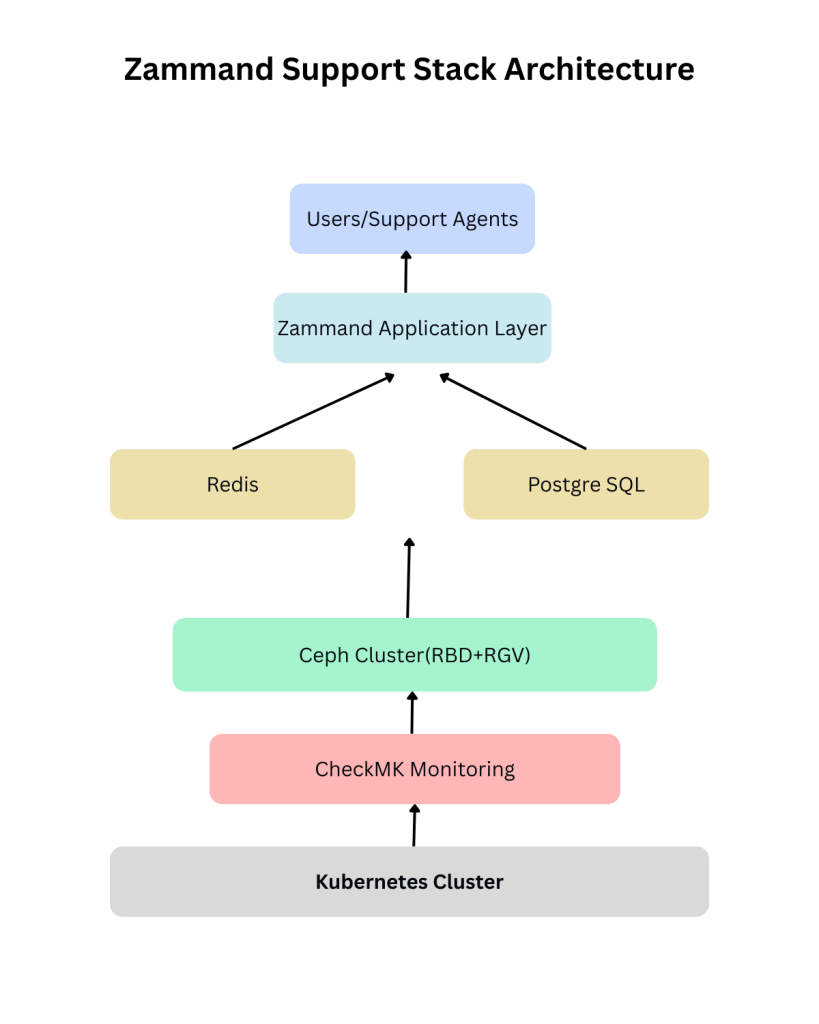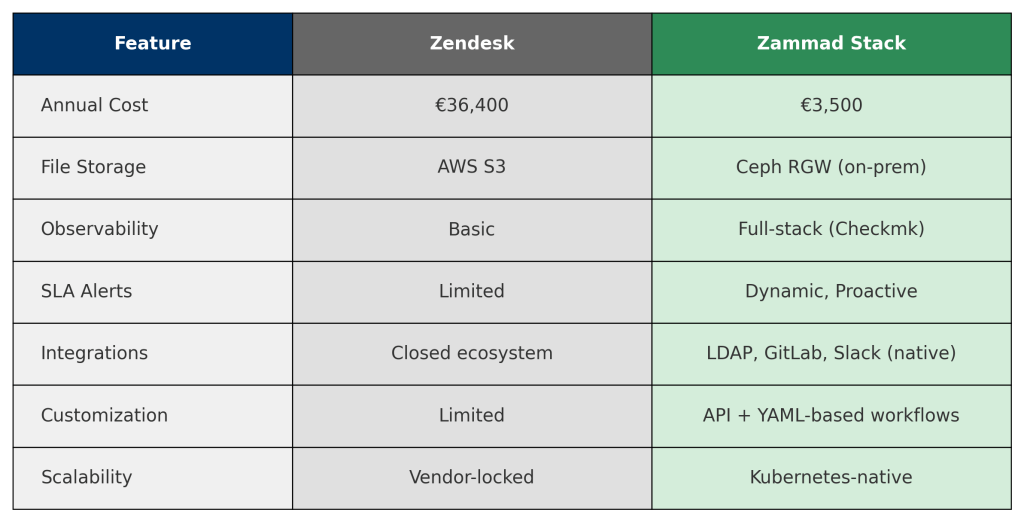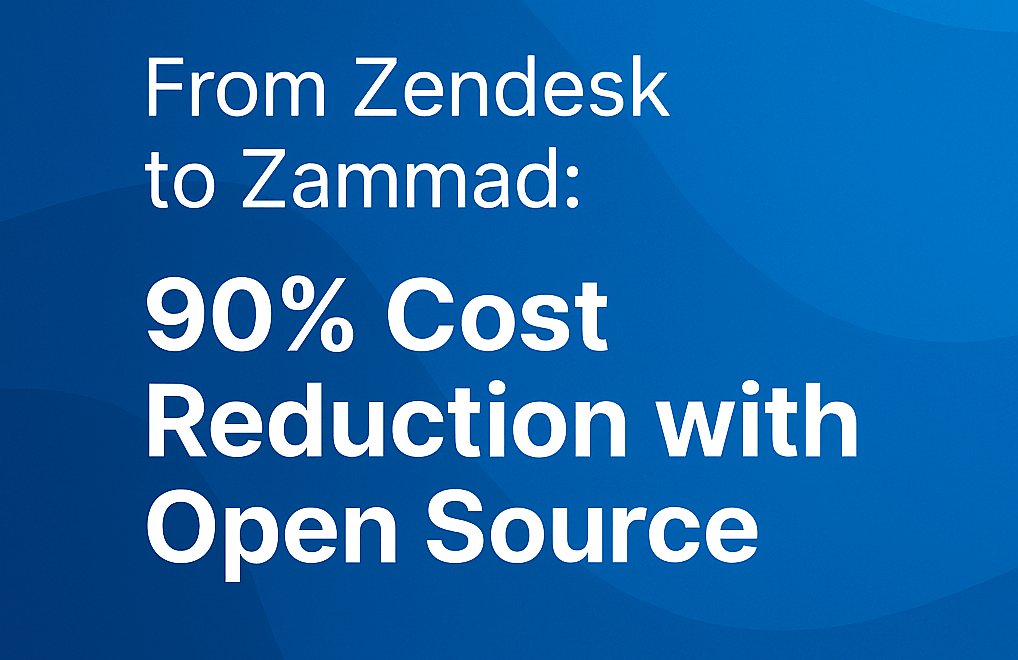From Zendesk to Zammad: How Our Client Reduced Support Costs by 90% with Open Source
Introduction
At Kubedo, we help our clients build sustainable, scalable, and secure infrastructure using open source technologies. This case study outlines how one of our European SaaS customers transitioned from Zendesk to an open source helpdesk stack — powered by Zammad, Ceph, Kubernetes, and Checkmk. The result: a 90% reduction in annual costs, improved SLA tracking, and full control over their support operations.
Customer Profile
Our client is a fast-growing SaaS company with a 30-person support team handling more than 1,800 tickets per day. As the business scaled, the limitations of their Zendesk-based support stack became more apparent — especially in terms of cost, integration flexibility, and compliance.
Why They Left Zendesk
Though Zendesk initially met their needs, they encountered several blockers over time:
- High licensing cost: EUR 36,400 annually
- Limited native integrations: LDAP, GitLab, and Slack required custom bridges
- Attachment storage on AWS S3: Additional EUR 4,000/year
- Low observability: No native metrics or alerting
- Vendor lock-in and data privacy concerns
Designing a Modern, Open Source Stack
Working closely with the customer’s DevOps team, we designed a replacement architecture with:
- Zammad for open source ticketing
- Kubernetes for orchestration
- Ceph (RBD + RGW) for local, scalable storage
- Checkmk for monitoring and SLA enforcement
All components run on their self-managed Kubernetes support platform, fully automated via GitLab CI/CD pipelines.

Zammad – Ticketing Core
- REST API + YAML-driven automations
- SLA policy engine, custom workflows
- Integrated with GitLab, LDAP, Slack
Migrating from Zendesk to Zammad allowed our client to customize ticket flows, reduce support costs, and improve agent efficiency.
Ceph – GDPR-Compliant Storage
- RGW (S3-compatible) for file attachments
- RBD for PostgreSQL and Redis volumes
- On-premise, compliant with EU data laws
By replacing AWS S3 with Ceph RGW, they achieved GDPR compliance while cutting cloud storage costs.
Kubernetes – Cloud-Native Deployment
- Containerized support stack with horizontal scalability
- Rolling updates and high availability setup
Leveraging a Kubernetes support platform provided self-healing capabilities and improved uptime for their helpdesk operations.
Checkmk – Unified Observability
- Monitors Redis queues, API latency, SMTP/IMAP services
- Tracks Ceph health and RGW usage
- Sends SLA violation alerts to Slack and email
With Checkmk SLA tracking, they proactively resolved performance bottlenecks before they affected end users.
6-Month Impact Summary

Addressing Technical Concerns
“Isn’t self-hosting more expensive?”
Not when you already operate Kubernetes and Ceph. Initial effort: 3 weeks of DevOps time. Ongoing: managed by a part-time engineer.
“Is Zammad mature enough?”
Yes. We load-tested with 1,500 concurrent users. 95th percentile response time stayed below 500ms, validating the robustness of our Zammad implementation.
“Why not Prometheus?”
Checkmk offers faster time to value, simpler configuration, and better visibility for support-focused metrics like ticket queues and SLA compliance.
“Is Kubernetes + Ceph overkill for a helpdesk?”
Not for this customer. They already had the stack — extending it avoided new vendor dependencies and ensured consistency.
Conclusion
This migration wasn’t just about cost savings — it was about regaining control.
Our customer now benefits from:
- Full visibility across their open source helpdesk infrastructure
- GDPR-compliant local data storage with Ceph RGW
- Custom workflows tailored to their operation
- Reduced operating costs by over 90%
If your team is considering a move away from Zendesk or evaluating open source helpdesk solutions like Zammad, we’d be happy to share more details or help assess your architecture.


